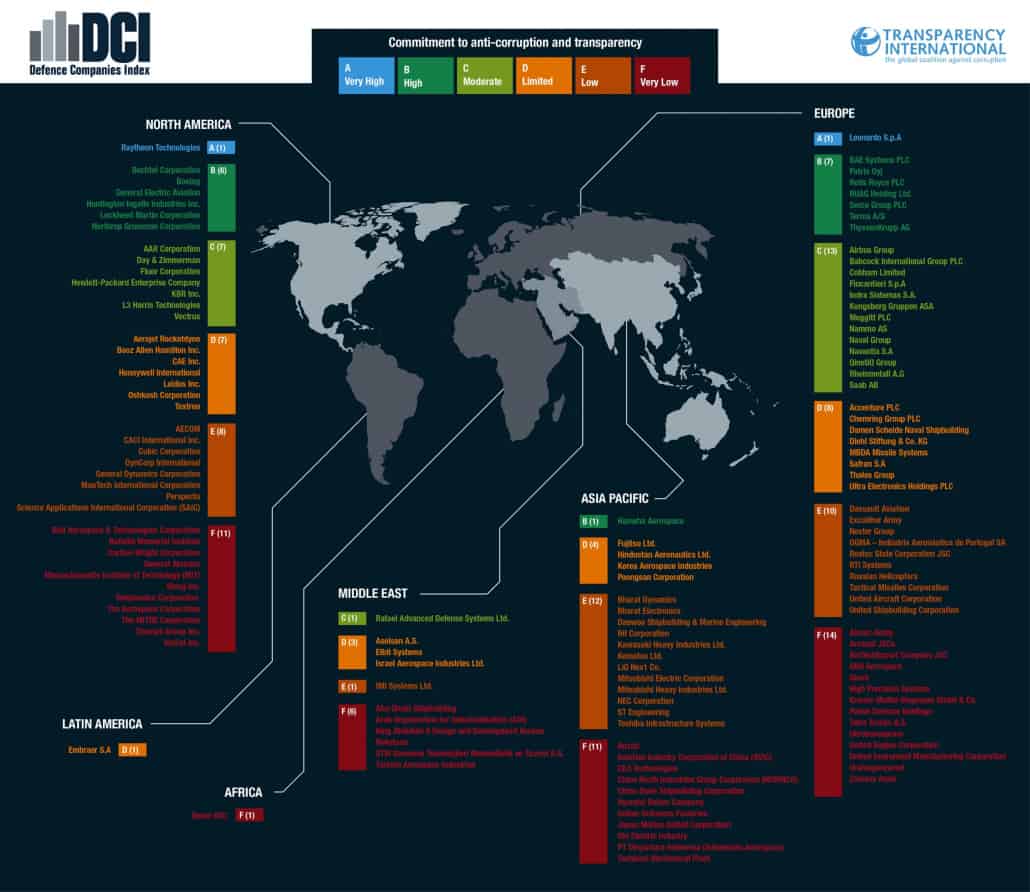|
Getting your Trinity Audio player ready...
|
Image: Wikimedia Commons under CC Attribution-Share Alike 3.0 Unported
Nearly three quarters of the world’s largest defence companies show little to no commitment to tackling corruption, new research from Transparency International reveals.
The Defence Companies Index on Anti-Corruption and Corporate Transparency (DCI) is the only global index that measures the commitment to transparency and anti-corruption of the world’s leading defence companies.

Key findings:
- Just 12% (16) of the 134 companies assessed receive a top ‘A’ or ‘B’ ranking, demonstrating a high level of commitment to anti-corruption.
- 73% (98) received a ‘D’ or lower, indicating little commitment to transparency and anti-corruption.
- Of the 36 companies that scored a ‘C’ or higher, 21 are based in Europe and 13 are headquartered in North America.
Analysis of the results reveals that most companies score lowest in business areas that face the highest risk of corruption.
Many firms do not publicly acknowledge they face increased risks when doing business in corruption-prone markets nor do they have measures in place to identify and mitigate these risks. Few take measures to prevent corruption in ‘offsets’ – controversial sweeteners often bolted on to defence contracts – and most do little to counter the high risk of bribery associated with using agents and intermediaries to broker deals on their behalf.
Many companies score well on the quality of their internal anti-corruption measures, such as public commitments to fighting corruption and processes to prevent employees from engaging in bribery. However, because most companies publish no evidence on how these polices work in practice, it is impossible to know whether they are actually effective.

“These results reveal the defence sector remains mired in secrecy with companies often displaying inadequate policies and procedures to safeguard against corruption. With nearly three quarters of companies failing to achieve a ‘C’ grade, clearly much more needs to be done. Given the well-established link between corruption and conflict, failure to do this will cost lives.
“Despite the overall picture looking bleak, there are some signs of progress in these results. Greater transparency and disclosure contribute to meaningful oversight and reducing corruption in the defence sector. Companies that improve both the quality and transparency of their anti-corruption efforts will see they are not only helping reduce human suffering but also aid to the promotion of the rule of law, which will benefit companies wishing to do their business in a clean way.”
Natalie Hogg, director of Transparency International’s Defence & Security Programme
The defence industry is a prime target for corruption because of the vast amount of money involved (global military expenditure in 2019 was estimated at more than $1.9-trillion, or R28.4-trillion), the close links between defence contracts and politics, and the notorious veil of secrecy under which the sector operates.
The impact of corruption in the arms trade is particularly serious. The value of defence contracts means that huge amounts of public money can be wasted, instead of being spent on essential services. Corruption perpetuates conflict and costs lives when troops are equipped with inadequate equipment and corrupt officials use gains from defence deals to strengthen their personal positions and undermine democracy.
The DCI provides a roadmap to better practice within the defence industry. It promotes appropriate standards of anti-corruption and transparency of policies and procedures suited to the risks faced in the defence sector. Adopting these not only reduces corporate risk, but also in turn helps to increase accountability and reduce the risk of corruption in the sector more widely.
We call on defence companies to commit to greater corporate transparency by increasing meaningful disclosures of:
- How they assess and mitigate the risks associated with operating in corruption-prone countries and publicly acknowledge the heightened risks of doing business in these markets;
- The anti-corruption programmes that are in place and the implementation of their policies and procedures;
- Measures to prevent and tackle corruption in all high-risk business areas, including the use of intermediaries, relationships with suppliers, joint ventures, offsets and interactions with public officials;
- Data that demonstrates the effectiveness of their anti-corruption programmes, such as staff surveys, audits and data regarding the use of whistleblowing hotlines and sanctions of transgressions;
About the Defence Companies Index on Anti-Corruption and Transparency (DCI)
The DCI analyses the commitment to transparency and anti-corruption in the world’s 134 largest defence companies.
It analyses publicly available information to assess the quality, extent and availability of anti-bribery and corruption policies and procedures in 10 key areas where increased commitment to anti-corruption ad transparency of information could reduce corruption risks in the defence industry.
The DCI does not measure corruption or how well a company’s anti-corruption measures work in practice as most disclose nothing on whether their polices and procedures are effective. A high DCI score does not indicate a company is immune to corruption – even companies with the most robust anti-corruption measures face risks and, in some cases, incidents of corruption.
The DCI follows two previous corporate indices published in 2015 and 2012, known as the Defence Companies Anti-Corruption Index. Due to significant changes in the aim, focus, methodology and question set of the 2020 index, any comparison with previous indices is not possible or appropriate.
About Transparency International – Defence & Security
The Defence & Security Programme is part of the global Transparency International movement and works towards a world where governments, the armed forces, and arms transfers are transparent, accountable, and free from corruption.
Contact:
Harvey Gavin
harvey.gavin@transparency.org.uk
+ 44 (0)20 3096 7695
+ 44 (0)79 6456 0340








